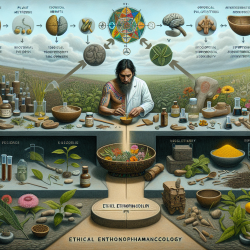Introduction
In the realm of speech-language pathology, we often look for innovative approaches to improve therapeutic outcomes for children. Similarly, the field of ethnopharmacology seeks to harness the potential of indigenous knowledge to develop new medical therapies. However, the ethical and legal challenges surrounding the protection of indigenous intellectual property rights pose significant hurdles. The research article "Patenting nature or protecting culture? Ethnopharmacology and indigenous intellectual property rights" by Ian Vincent McGonigle provides insights that can guide practitioners in navigating these complexities.
The Ethical Dilemma
Ethnopharmacologists study indigenous medicines and healing practices, often leading to the development of new therapies. However, this process raises ethical questions about the ownership of nature and the distribution of profits from drugs developed using indigenous knowledge. The article highlights the inadequacy of current intellectual property rights (IPR) frameworks in recognizing and protecting indigenous resources and knowledge.
Ontological Pluralism and Epistemic Subsidiarity
Two key concepts introduced in the article, 'ontological pluralism' and 'epistemic subsidiarity,' offer potential pathways to more equitable solutions. Ontological pluralism involves acknowledging and respecting the diverse worldviews and knowledge systems of indigenous communities. This approach challenges the dominant Western scientific perspective and calls for a more inclusive understanding of nature and property.
Epistemic subsidiarity, on the other hand, advocates for decision-making at the lowest feasible level of governance, allowing local values and knowledge systems to be prioritized. This concept suggests the establishment of special courts or legal frameworks that consider indigenous claims on their own terms, potentially leading to more just trade agreements and policies.
Implications for Practitioners
For practitioners in the field of ethnopharmacology and beyond, incorporating these concepts into their work can lead to more ethical and effective outcomes. Here are some actionable steps:
- Engage with indigenous communities in a respectful and reciprocal manner, recognizing their knowledge and contributions.
- Advocate for policy changes that incorporate ontological pluralism and epistemic subsidiarity, ensuring that indigenous voices are heard and valued.
- Collaborate with interdisciplinary teams, including anthropologists and legal experts, to navigate the complex ethical and legal landscape.
- Promote awareness and education about the importance of protecting indigenous intellectual property rights within the broader scientific and medical communities.
Conclusion
While the challenges in protecting indigenous intellectual property rights are complex, the concepts of ontological pluralism and epistemic subsidiarity provide a promising framework for more equitable solutions. By embracing these ideas, practitioners can contribute to a more just and ethical field of ethnopharmacology, ultimately benefiting both indigenous communities and the wider world.
To read the original research paper, please follow this link: Patenting nature or protecting culture? Ethnopharmacology and indigenous intellectual property rights.










